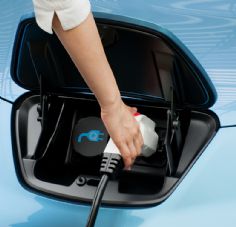IBM and ESB have today launched a new fully integrated, smarter charging system that will help manage electric vehicle public charge-points, which are being rolled out across Ireland by ESB Networks.
The system will manage and support the 1,000 charging points throughout the country. Electric vehicle (EV) users have an RFID card that allows them to use the charging systems. The charging points, whether home, street or service station units, are SIM card equipped for mobile network communications. The charge points can then ensure that the EV’s state of charge, charge time and consumption can be monitored and optimised, with intelligent billing to take advantage of the likes of renewables, low or special tariffs and then apply the correct charges to the user’s account. The charges can be made directly to an EV user’s energy account, or directly as with a service station.
The base systems that support the intelligent network were developed by IBM with the ESB and are hosted on IBM’s intelligent electric vehicle platform, which is cloud-hosted and highly scalable. It is expected that by 2020, one ten on Irish roads will be hybrid or electric, with that set to rise to 60% by 2060.
Clay Luthy, global distributed energy resource manager, IBM, said that ESB Networks is the "anchor client" for the platform which is based on open standards that will allow third party service providers to use the data and the platform to provide value added services. There is already a mobile application that shows the location of charge points that allows reservations to be made for charge time.
As EV become more popular, Luthy said that intelligence of the network becomes increasingly important. He said that an EV charging is akin to a small household in terms of demand and the fact that such units are mobile means that the entire grid needs to be able to accommodate them. This is a major change for the way that grids are designed and managed, said Luthy, and will require the kind of granular information that only embedded intelligence can provide.
Dermot McArdle, managing director, ESB eCars, said that Ireland is well equipped to meet this challenge as independent assessments of Ireland’s national grid have indicated that it is among the best in the world in terms of intelligence.
McArdle said that EV adoption is a critical element for the Government in achieving its ambitions of reducing emissions nationally, as transport is a major source of such emissions, both in terms of its own targets and EU guidelines. But there are other benefits too. Currently, power generation and grid management involves taking power stations on and off line as demand necessitates. With intelligent EV charging and management, it is expected that there would be less need for this as the demand cycles would "flatten out", said McArdle, leading to a project saving of around €50 million per year.
Also, a potential future use of the intelligent system might be to have charged cars as sources of power when not in use. McArdle said that there is no reason why a charged car that is not in use could not feed back into the grid, if required, and that the current intelligence in the system could accommodate this case.
Attending the launch, Minister for Jobs, Enterprise and Innovation, Richard Bruton TD said, "Green energy and cloud computing are key sectors being targeted by the Government as part of our Action Plan for Jobs. This innovative partnership between an Irish energy company and a global IT leader puts Ireland at the forefront of global developments in the electric vehicle sector by using cutting edge cloud technologies, and represents a clear demonstration of what is possible in this area. Ireland will now be the first country globally to put in place this system on a national basis, and I am determined to ensure that through continued implementation of our plan we will see further examples of leadership in these areas."
TechCentral Reporters








Subscribers 0
Fans 0
Followers 0
Followers